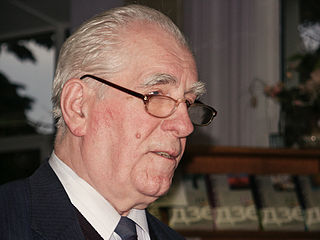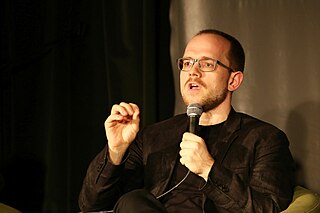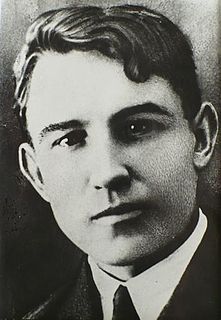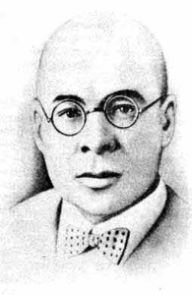 W
WAles Adamovich was a Belarusian Soviet writer and a critic, Professor and Corresponding Member of the Academy of Sciences of Belarus, Doctor of Philosophy in philology, Doctorate in 1962 ; member of the Supreme Soviet (1989–92). He wrote in Russian and Belarusian.
 W
WSvetlana Alexandrovna Alexievich is a Belarusian investigative journalist, essayist and oral historian who writes in Russian. She was awarded the 2015 Nobel Prize in Literature "for her polyphonic writings, a monument to suffering and courage in our time". She is the first writer from Belarus to receive the award.
 W
WRyhor Ivanavič Baradulin was a Belarusian poet, essayist and translator.
 W
WJan Barszczewski was a Polish-Lithuanian writer, poet and editor. He wrote both in Ruthenian and Polish languages.
 W
WShmuel Yefimovich Plavnik, better known by the pen name Źmitrok Biadula, was a Jewish Belarusian poet, prose writer, translator, and political activist in the Belarusian independence movement. He is considered one of the fathers of modern Belarusian literature.
 W
WAles Bialiatski is a Belarusian civic leader and former prisoner of conscience known for his work with the Human Rights Centre “Viasna”. In 2020, he won Right Livelihood Award, widely known as the "Alternate Nobel Prize".
 W
WJanka (Yanka) Bryl was a Belarusian writer best known for his short stories. He was one of the older generation of Soviet writers who had begun their literary careers in Stalin's time but received a new lease on life in the late 1950s along with such contemporaries as Ivan Shamiakin and Ivan Melezh.
 W
WVasíl Uładzímiravič Býkaŭ was a prolific Belarusian author of novels and novellas about World War II and a significant figure in soviet and Belarusian literature and civic thought. His work earned him endorsements for the Nobel Prize nomination from, among others, Nobel Prize laureates Joseph Brodsky and Czesław Miłosz.
 W
WWasyl Ciapiński was a Belarusian-Lithuanian noble, humanist, educator, writer, publisher and translator from the Grand Duchy of Lithuania known for translating the Bible into the Belarusian language. He was behind the printing of the "Moscow Gospel" in the 1570s, and is regarded as one of the early facilitators of Belarusian printed literature. His Bible is sometimes understood to have been printed in Ukrainian but is today generally regarded as Belarusian language.
 W
WUladzimir Mikalahevič Dubouka was a Belarusian poet, prose writer, linguist, and a literary critic.
 W
WVincent Dunin-Marcinkievič was a Belarusian writer, poet, dramatist and social activist and is considered as one of the founders of the modern Belarusian literary tradition and national school theatre.
 W
WMaksim Harecki was a Belarusian prose writer, journalist, activist of the Belarusian national-democratic renewal, folklorist, lexicographer, professor. Maksim Harecki was also known by his pen-names Maksim Biełarus, M.B. Biełarus, M.H., A. Mścisłaŭski, Dzied Kuźma, Maciej Myška, Mizeryjus Monus. In his works he often appeared as Kuźma Batura, Liavon Zaduma.
 W
WLarysa Hienijuš was a Belarusian poet, writer and active participant of the national movement.
 W
WNil Hilevich was a Belarusian poet, a professor in the Belarusian State University, the author of more than 80 books of poetry, publications, and translations, and one of the founders of the Frantsishak Skaryna Belarusian Language Society.
 W
WAdam Hlobus is a Belarus writer and novelist, essayist, poet, publisher and artist.
 W
WMikołaj Hussowczyk. Other name spelling variants include Hussoviensis, Hussovianus, Ussovius, Hussowski, Gusowski); was an early Renaissance poet and humanist of Grand Duchy of Lithuania, and cultural and social activist. His most notable work is a poem Carmen de statura...bisontis.
 W
WWincenty Konstanty Kalinowski, also known as Vincent Kanstancin Kalinoŭski or Kastuś Kalinoŭski, Konstanty Kalinowski (Polish) and Konstantinas Kalinauskas (Lithuanian), was a 19th-century Belarusian writer, journalist, lawyer and revolutionary. He was one of the leaders of the Polish, Lithuanian and Belarusian national revival and the leader of the January Uprising in lands of the former Grand Duchy of Lithuania in the Polish–Lithuanian Commonwealth.
 W
WUladzimir Karatkievich was a Belarusian romantic writer.
 W
WCyril of Turov, alternately Kirill of Turov was a bishop and saint of the Russian Orthodox Church. He was one of the first and finest theologians of Kievan Rus'; he lived in Principality of Turov, now southern Belarus. His feast day in the Orthodox Church is on 28 April. He was added to the Roman Catholic Church calendar by Pope Paul VI in 1969.
 W
WYakub Kolas, real name Kanstantsin Mitskievich was a Belarusian writer, People's Poet of the Byelorussian SSR (1926), member (1928) and vice-president of the Belarusian Academy of Sciences.
 W
WSylvester Kossów, Kosiv or Kosov was a Ruthenian Orthodox metropolitan of the Polish–Lithuanian Commonwealth and Polish-Ruthenian writer. He served as metropolitan of Kiev, Galicia and all Ruthenia (1647–1657) during the Khmelnytsky uprising. His official title was Metropolitan of Kiev, Galicia and All-Ruthenia.
Mordechai Hillel Kroshnitz was a Yiddish writer, editor, essayist and journalist. A Zionist, and an Israel Labor Party activist.
 W
WYanka Kupala – was the pen name of Iván Daminíkavich Lutsévich, a Belarusian poet and writer. He is considered one of the greatest Belarusian-language writers of the 20th century.
 W
WYuri Vladimirovich Kuryanovich is a Belarusian writer, translator, historian, and artist.
 W
WMaksim Łužanin, was a Belarusian prose writer, poet, screenwriter, translator, essayist, and a literary critic. In 1969, he was awarded for the Honored Artist of the Byelorussian SSR and in 1975, Luzanin was awarded with the honorary badge Meritorious Activist of Culture of People's Republic of Poland.
 W
WIvan Melezh was a Belarusian writer of fiction and drama.
 W
WEvgeny Morozov is an American writer, researcher, and intellectual from Belarus who studies political and social implications of technology. He was named one of the 28 most influential Europeans by Politico in 2018.
 W
WAlexander Nadson was the Apostolic Visitor for Belarusian Greek-Catholic faithful abroad and a notable Belarusian émigré social and religious leader.
 W
WSergiusz Piasecki - was one of the best known Polish language writers of the mid 20th century. His crowning achievement, Kochanek Wielkiej Niedźwiedzicy published in 1937, was the third most popular novel in the Second Polish Republic. Following World War II, Piasecki's books were banned by communist censorship in the People's Republic of Poland.
 W
WAles Prudnikau was a Belarusian poet. He was a cousin of another Belarusian writer, Pavel Prudnikau.
 W
WPavel Ivanovich Prudnikau was a Belarusian writer. He was a cousin of another Belarusian writer, Ales Prudnikau.
 W
WBella Rosenfeld Chagall was a Jewish Belarusian writer and the first wife of painter Marc Chagall. She was the subject of many of Chagall's paintings including Bella au col blanc in 1917, and appears posthumously in Bouquet près de la fenêtre, painted in 1959-1960.
 W
WAlexander Onufrievich Savitsky, also known as Ales Savitsky, was a Belarusian writer and public figure. He was a member of the Writers' Union and the Union of Writers of the BSSR from 1961 to 2015.
 W
WCarlos Sherman was a Uruguay-born Belarusian–Spanish translator, writer, human rights activist and honorary vice-president of the Belarusian PEN Center. He translated from Spanish into Belarusian and Russian.
 W
WSolomon Efimovich Shulman, also known as Sol Shulman and Semion Shulman, was an author, screenwriter, film director and adventurer.
 W
WLudwika Savitskaya (1892–1991), using the pen-name Zoska Veras, was a Belarusian writer.
 W
WAnatol' Volny was a Belarusian artist, poet, writer and journalist. During the Great Purge, he became a victim of the 1937 mass execution of Belarusians. Posthumously rehabilitated in 1957.
 W
WZmicier Zhylunovich was a Belarusian poet, writer and journalist, known under pen name Tsishka Hartny, and a political leader.